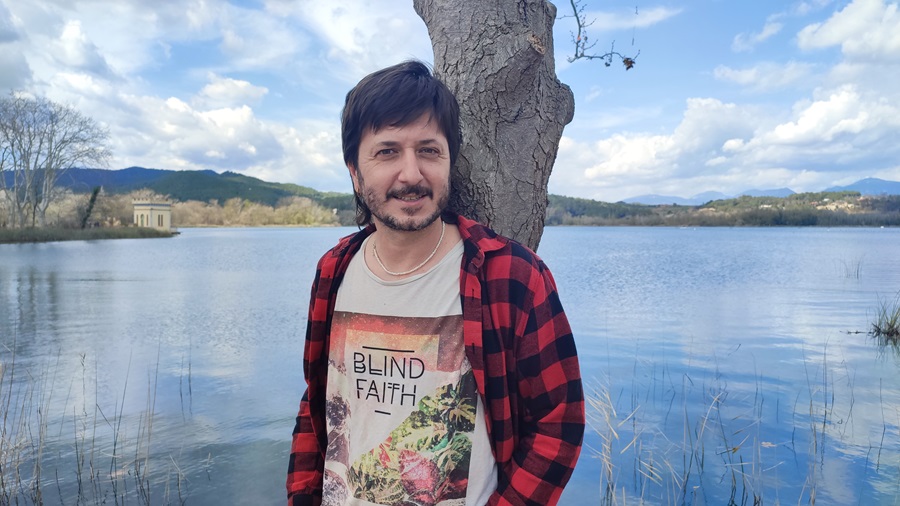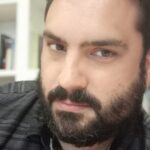- HumanitiesLiterature
- 15 de January de 2025
- No Comment
- 11 minutes read
Alberto Torres Blandina: “People no longer seek truth”

An Interview with Alberto Torres Blandina
Alberto Torres Blandina: “People no longer seek truth”


Alberto Torres Blandina is a teacher of literature and creative writing, He has written eight novels, three children’s books, and two poetry collections. His latest work, El arte de educar estúpidos (Barlin Libros), where he reflects on the processes of teaching and learning, as well as the liquid world in which we are destined to navigate as adults and adolescents.
The inevitable first question: how did the idea for El arte de educar estúpidos come about? If I’m not mistaken, this is your first foray into essay writing.
During a trip to Iceland to explore their educational system, I was struck by how vastly different it was from Spain’s. I witnessed seven-year-olds in a cooking class working with knives and open flames. Naturally, I asked the teacher if accidents ever happened. He replied, “Yes, of course”. Curious, I asked, “And what do the parents say?” He looked puzzled. “Aren’t you afraid of being sued?” I pressed on. His confusion deepened: “Why would they sue us? If children work with fire, they might get burned now and then, right?”
Such questions made perfect sense in an overprotective country like Spain, where even upper secondary students aren’t allowed to leave school premises unaccompanied, lest something happen. But in Iceland, my queries seemed absurd. This cultural “lost in translation” moment gave me much to think about.
“This mindset undermines responsibility, autonomy, creativity, entrepreneurship, and maturity”
This wasn’t the only experience, as I recount in the book, that surprised me. What these situations had in common was a reliance on trust and responsibility over overprotection and distrust. Later, as I researched other systems, it became evident that while the Spanish education system has its merits, it also has significant flaws. Chief among these is an implicit, unspoken assumption—reflected in legislation, parental attitudes, and even school leadership—that children and adolescents are incapable and therefore must be constantly supervised. This mindset undermines responsibility, autonomy, creativity, entrepreneurship, and maturity. It’s evident in university students whose parents still fill out their enrolment forms.
I decided to write the book because I believe we’re overlooking the fact that good intentions don’t always lead to good outcomes. By trying to make life easier for young people, we inadvertently make them dependent and less resourceful. I subscribe to Plato’s view that people act wrongly out of ignorance (yes, I’m an optimist by nature—and by considerable effort, ha!). Above all, I wanted this to be an accessible essay, not an academic one—a book that tackles difficult topics in a straightforward, engaging way, inviting readers to join the debate. I shy away from academicism in my writing, though not in my reading, as I find it somewhat elitist.
You write: “It feels as though there’s a Big Brother watching everything, compelling teachers to self-censor and administrators to act as censors, creating rifts in the educational community” (p. 28). Is this true?
Yes, it’s symptomatic of a culture of extreme overprotection—a near-pathological climate—that pervades everything. It’s a peculiarly Spanish (or perhaps Mediterranean) mindset: a mother feels guilty if she can’t breastfeed or is judged harshly if she chooses not to; parents do their children’s homework and pressure teachers to pass them to spare them the trauma of failure. If a student climbs over the school fence to leave (in Iceland, schools don’t have fences), parents sue the school, as if teachers were security guards rather than educators. School administrators closely monitor teachers’ actions to pre-empt complaints, for fear that mentioning Darwin might upset a Catholic student, leading to parental outrage.
“We fail to realise that we’re obsessed with shielding children from the very experiences that help them grow, understand the world, confront challenges, reflect, and manage negative emotions”
We fail to realise that we’re obsessed with shielding children from the very experiences that help them grow, understand the world, confront challenges, reflect, and manage negative emotions. The consequences are inevitable. It’s reminiscent of a story about Europeans who built a well in an African village to spare women a three-kilometre trek. The women, however, were devastated, as fetching water together was their only respite from a deeply patriarchal society. Good intentions can sometimes lead to bad outcomes.
The subtitle of your book is “A Sociological Critique to Restore Trust in Education”. Is this the key to your approach? Could you elaborate on it?
I think the title itself, El arte de educar estúpidos, is an ironic jab at how the system educates young people as though they were fools. Yet, I firmly believe they’re not. Take, for example, the so-called “snowflake generation”. They’re the ones who took to the streets to clear mud after the recent Valencia floods, which says a great deal about how society has misjudged them.

I aim to write positively. While much of the book critiques the education system as a reflection of an overprotective, Disneyfied, and capitalist society—where parents see themselves as customers entitled to have opinions on everything. And where the lack of work-life balance leads to compensation through complaints against those who educate your children. This is further compounded by a societal moment of cultural warfare and the discrediting of reason and science.
After the critique, the book’s final section provides practical ways to instigate change, if not on a global scale (which is difficult for now, we can only open the debate in the short term), then at least in our own lives, in our approach as parents, and in our classrooms if we are educators.
“Parents distrust teachers” (p. 28). Can you expand on that?
The book identifies four layers of distrust in the education system: adults’ distrust of minors; parents’ distrust of teachers; legislators’ and school administrators’ distrust of educators; and ultimately, students’ distrust of themselves. If no one trusts your abilities, how could you trust yourself?
“Between an objective fact and hearsay, most people will choose the hearsay if it reinforces their biases” (p. 54). What can be done about this?
Individualism has led to a distrust of science—seen in movements like anti-vaxxers, flat-earthers, and religious extremism. At its core, it reflects a distrust of humanity, which has painstakingly worked together for centuries to achieve scientific and technological progress. Algorithms on social media exacerbate this by creating echo chambers that reinforce even the most absurd beliefs. Consequently, people no longer seek truth but rather validation for their chosen “truth.” A glance at the state of modern media confirms this. News outlets no longer prioritise truth but instead cater to their audience’s preconceptions. A FOX presenter once admitted: “We knew it was a lie, but our viewers didn’t want it to be, so we said it was true”.
“Individualism has led to a distrust of science—seen in movements like anti-vaxxers, flat-earthers, and religious extremism”
How would you improve Spain’s state education system? What changes are most urgent, and where would you begin?
The frustrating part is that everyone knows what needs to be done, even the least informed among us. What’s infuriating is that it doesn’t happen because there’s no political will. First, we need a bipartisan agreement on an education law that doesn’t change every five years. Second, reduce bureaucracy, which stems from the distrust we discussed earlier and wastes teachers’ time on paperwork instead of teaching. Third, lower student-teacher ratios and hire more specialists, particularly for inclusion. Integration without resources is meaningless. Lastly, focus on trust and empowerment, not overprotection and distrust—the theme of my book.
Your previous book was not a conventional novel. Allow me to take a brief step back to April, when you published Tierra (Candaya). What is this work? Could you explain it briefly?
Tierra is a project I began during a writers’ residency in South Korea. Over several years, I engaged in conversations with people from more than a hundred countries, discussing their lives and those of their families to uncover the “microhistory” of the world—the stories of those who never make it into history books. From the construction of the Berlin Wall to the COVID pandemic, the book explores how families from diverse nations, cultures, and religions experience the weight of History firsthand: wars, political upheavals, technological revolutions, shifting fashions, groundbreaking ideas. It’s a book about recent history as told by those whom history typically overlooks.
What are you currently writing? Will it be more similar to El arte… or to Tierra?
At the moment, I’m revising an essay on Spanish literature titled Las malas obras (The Bad Works). It’s based on the idea that great works of art are often considered “bad” by their contemporaries, either because they don’t align with the prevailing ethics, aesthetics, or politics of their time. The essay examines how such works embraced the future, often facing misunderstanding and rejection in their own era.
In addition, I’ve just finished a children’s novel titled Mundo fábula (Fable World). Both projects are currently seeking publishers—so if any editor happens to read this, feel free to get in touch, ha!
Source: educational EVIDENCE
Rights: Creative Commons

